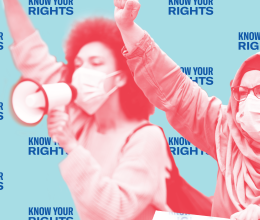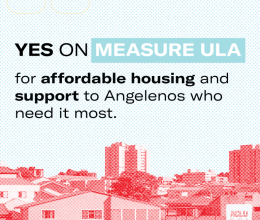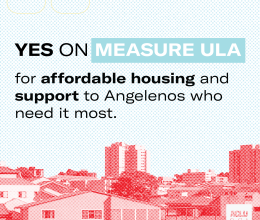
By Benny Grush
From bacon-wrapped hotdogs to freshly cut fruit, the food prepared by street vendors in Los Angeles is a vibrant reflection of the city’s diverse cultures.
But rather than embrace the contributions that street vendors make to Los Angeles’ economic and culinary landscape, city officials instead have chosen to punish them.
Not content with harsh misdemeanor citations and fees, the LAPD–working in concert with employees of the Fashion District Business Improvement District (BID)–have been confiscating and destroying vendors’ property, in violation of constitutional protections against unreasonable seizures and the right to due process.
Last year, the ACLU and its partners filed a lawsuit to put a stop to these illegal practices.
But the root of these problems is simple: street vending is banned in the city.
Los Angeles is one of the only major cities in the country to ban street vending. The city council now has an opportunity to legalize street vending as it considers proposals to adopt a permit system. The proposals mark the first attempt to regulate street vending since a failed effort to create vending districts in 1994.
The past effort was unsuccessful because the process for creating a vending district was too cumbersome, and enabled vending-opponents to prevent the formation vending districts throughout the city.
Ultimately, that system resulted in only one tiny district in MacArthur Park being authorized for vending while the ban remained in place in the rest of the city. The MacArthur Park district ultimately disintegrated as restrictions unduly limited the availability of permits.
Currently, the Los Angeles City Council is considering the best method to regulate street vending. A study commissioned by the council’s Economic Development Committee has proposed three different vending options.
One would allow street vending throughout the city, a second would create a district based system giving districts the option to participate and the third would be a hybrid between the citywide and a district based system.
The district based plan and the hybrid approach suffer from the same basic flaw as the past attempt at reform: by leaving power at the district level, the systems will enable vending opponents to ban or restrict vending in a manner that leaves vending illegal in large swaths of the city.
The only policy that will achieve the goal of legalizing vending—and putting an end to unfair and illegal enforcement practices—is a uniform city policy.
But this system does not give vendors a blank check. The city wide policy would include common sense restrictions on where street vendors can conduct business to protect street accessibility and health and safety. It would ensure that all street vendors follow safety regulations governing food sanitation, respect boundaries where they can operate their carts and leave sidewalks clear.
Rather than carving out large parts of the city that will continue to ban street vending, a uniform city-wide policy provides a more appropriate solution by regulating rather than eliminating street vending.
Benny Grush is communications intern at the ACLU of Southern California.






